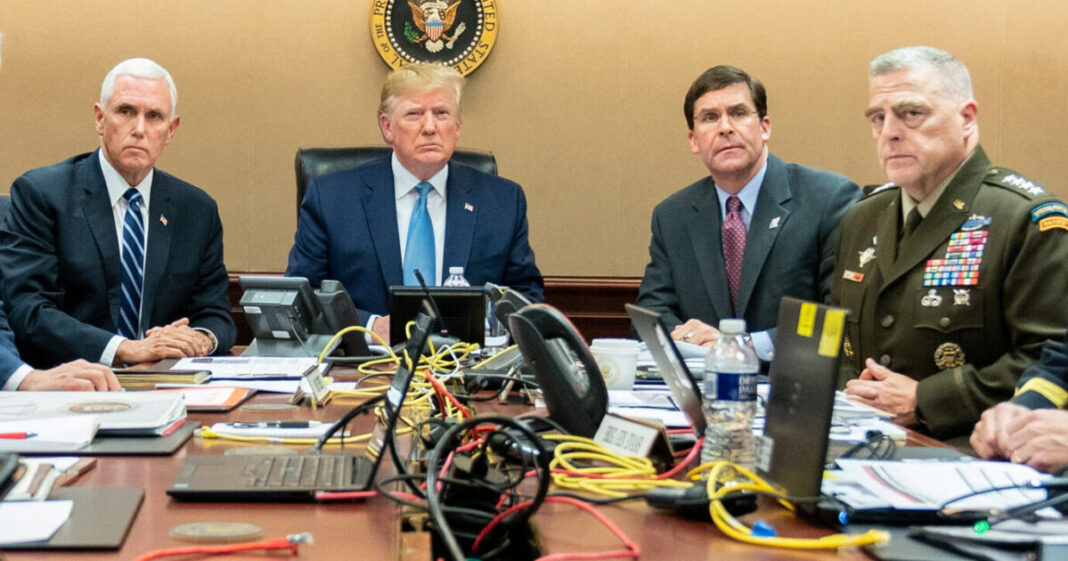“If you want peace, prepare for war.” These words, written by the Roman military strategist Vegetius around 390 AD, still resonate today. They serve as a timeless reminder that strength, not appeasement, is the surest path to peace—an idea that underpins America’s approach to global security.
In 2020, President Trump addressed the United Nations General Assembly, highlighting the U.S.’s military might as a key element of its role as a peacemaker, emphasizing “peace through strength.” He noted that during his administration, the U.S. had spent over $2.5 trillion on the military, ensuring it remained the most powerful in the world.
He also pointed to the historic peace agreements he had negotiated the Abraham Accords between Israel, the United Arab Emirates, and Bahrain, as the beginning of a “new Middle East,” with more nations expected to follow suit. Trump also reiterated that countries should prioritize their own citizens, a principle he believed was the foundation for true international cooperation.
In 2017, President Trump revived the principle of “peace through strength” in the White House, a sharp contrast to the Obama era, during which the U.S. leadership often apologized for perceived foreign policy missteps and weakened military capabilities. When Trump addressed the UN General Assembly in 2020, he declared that America was “fulfilling its destiny as peacemaker, but it is peace through strength.”
Under Trump’s leadership, “peace through strength” was evident in both military and diplomatic achievements. His administration held historic summits with North Korea, de-escalating tensions while maintaining military readiness. The defeat of ISIS followed ramped-up military operations. Trump withdrew from the Iran nuclear deal and imposed “maximum pressure” sanctions. Additionally, his administration brokered economic normalization between Serbia and Kosovo, resolved the Gulf rift with Qatar, and negotiated a Taliban agreement, ensuring no U.S. combat deaths in Afghanistan for nearly a year.
Other examples include Trump’s push for NATO allies to increase defense spending, reinforcing the alliance’s collective security, and the targeted killing of Iranian General Qassem Soleimani, which was intended to deter further Iranian aggression. These actions, combined with Trump’s commitment to increasing U.S. military spending, illustrated his belief that strength and a powerful military presence were key to securing peace and stability globally.
While it’s hard to prove a negative like deterrence, the facts speak for themselves: under Trump, Russia did not invade Ukraine, Hamas did not attack Israel, killing 1,200 civilians, the Houthis refrained from terrorizing ships in the Red Sea, Kim Jong-un kept his missile tests in check, and China largely left the Philippines and Japan alone. China also did not move to capture Taiwan. Considering the CCP has already said they prefer Kamala Harris over Trump, a Chinese move on Taiwan seems more likely under a Harris administration than it ever was under Trump.
Under the Biden administration, the world has grown increasingly more dangerous, and the need for a strong, assertive American foreign policy is greater than ever. A second Trump term, focused on “peace through strength,” could be welcomed not only by American voters but also by the free world. The strategic position of the U.S. has declined sharply in the three and a half years since Trump left office, with major crises such as the epic failure of the withdrawal from Afghanistan and escalating tensions in the Middle East and Taiwan.
In 1962, when Russia planned to place nuclear missiles in Cuba, the U.S. swiftly scrambled jets, ready to enter World War III. Under Biden, however, the U.S. has been slapped in the face multiple times with no significant retaliation. A Russian nuclear submarine has docked in Havana, Iranian missiles have attacked ships in the Red Sea, and Kim Jung Un has sent munitions to Russia. Now, North Korean troops are confirmed to be in Russia, expected to soon join the fighting in Ukraine. The contrast is stark.
Trump was committed to avoiding new wars and extended counterinsurgencies, making his presidency the first since Jimmy Carter’s where the U.S. did not engage in new conflicts or escalate existing ones. His decisive enforcement of redlines, such as the 2017 airstrike on Syria after Assad’s use of chemical weapons, underscored his stance. Contrary to claims of isolationism, Trump focused on recalibrating U.S. relationships, strengthening military cooperation with NATO, Japan, Israel, and Gulf states while prioritizing American interests under the principle of ” ‘America First’ Does Not Mean ‘America Alone.”
The United States needs Trump to restore its strategic position and ensure national security. Contrary to what critics claim, the world also needs his leadership to defuse the numerous powder kegs threatening global stability.


